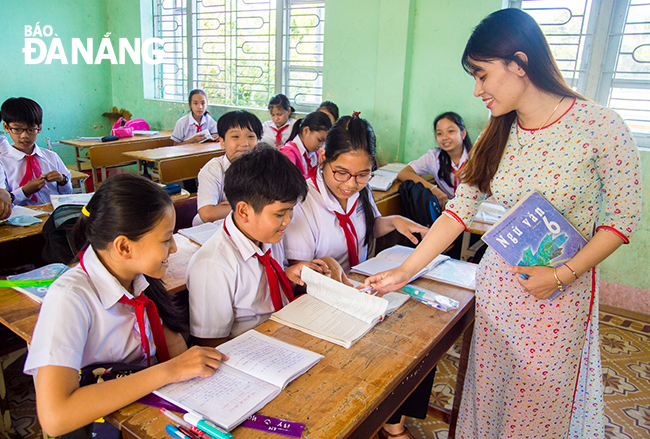The use and overuse of loanwords in Vietnamese language
There is increasing concern over excessive use of foreign words in Vietnamese language along with communication issues arising from overuse of foreign words, including Chinese characters and English in Vietnamese.
 |
| There needs to be a sensible use foreign words in the Vietnamese language in order to preserve the beauty of our mother tongue. In the photo: Pupils of the Nguyen Ba Phat Secondary School in Hoa Lien Commune, Hoa Vang District are learning Vietnamese Literature texts. Photo: XUAN SON |
Recently, Hoang Thuy Linh not only has been known nationally but also has gone viral on social media for her new song titled ‘See love’ due to its rhythm and choreography, plus its crank title. This song shows the international integration trend of Vietnamese young people. The word "See" in English is used in the title of this Vietnamese song for creating a play on words. “See” verb is pronounced as /si:/ that sounds like Vietnamese adjective word which carries its meaning of Si or infatuated. However, in terms of Vietnamese word structure, "See love" is a forced and meaningless word combination.
A loanword is a word adopted from a foreign language with little or no modification with the aim of filling lexical or semantic gaps in the target language. A language borrows from another either out of necessity or luxury. Borrowing out of necessity applies to cases where a language assimilates terms and expressions from another language to bridge a lexical or semantic “gap”. In most cases, this happens upon the introduction of a new object or concept from another country, culture or language. Most of IT words currently used in Vietnamese or terminology and expressions imported from English such as “Computer” , “Laptops”, "Cloud computing", "server", “internet” etc.
The general idea of luxury borrowing lies in facilitating communication even in cases where there is no actual lexical or semantic gap. However, there is growing trend of excessive use of borrowed expressions from foreign languages in Vietnamese.
Today, we will often hear many young people, and Vietnamese people as a whole, use words like shipper, menu, order, sale. In the Vietnamese language, all these expressions can be perfectly replaced by “người giao hàng”, “thực đơn”, “đặt/ gọi món”, “bán hạ giá”, respectively.
On the other hand, luxury borrowing, concerns words and expressions borrowed from another language or culture though there is no actual need to do so as the borrowing language already has perfectly equivalent terms to express the same concept. Think about the use of words such as “weekend", "livestream", "free", "check-in” whereas we have Vietnamese equivalents like “cuối tuần” “trực tiếp”,”miễn phí” "đăng ký', respectively.
This new trend is even more marked in such fields as tourism, trade, telecommunications, and finance.
Especially, the massive use of foreign words, especially English, in Vietnamese among young people causes irritation or annoyance, as well as shows their annoying or irritating habit of incomprehensible use of English words or expressions whereas there are perfect equivalents in Vietnamese too.
What’s going on with the Vietnamese language? Why is there so much and seemingly uncontrolled contamination of Vietnamese with foreign words, especially English? Why do we use so many foreign words even when Vietnamese vocabulary would suffice to convey the message more than adequately? Could it be because it makes us feel more international?
Hence, it is very necessary to raise public awareness about the growing trend of using foreign words in the Vietnamese language even when there is neither semantic nor lexical need. This trend is not only alarming but also totally uncalled for. We need to be a sensible use foreign words in the Vietnamese language in order to preserve the beauty of our mother tongue.
There is a great need for developing specific solutions and implementing them in a drastic and synchronous manner to protect the purity of our native language, for the preservation of its identity in order to meet requirements raised in the National Cultural Conference in 2021 and in line with the Directive No. 23 issued by the Da Nang Party Committee dated December 27, 2022.
It is emphasized that the purity of our mother tongue should be protected by every citizen, and that is our prior duty. The most important task in mother language protection is to translate loanwords from foreign languages, mainly English, into Vietnamese in a quickly and concise way with a clear meaning for easy to use in communication and writing in daily life.
Media agencies, organizations, and businesses across Da Nang need to take action to preserve the beauty of our mother tongue and encourage the correct use of Vietnamese language in their advertising, promotion and communication activities in a bid to avoid excessive use of foreign words in Vietnamese. Functional agencies in Da Nang should strengthen management over the implementing of regulations on the use of Vietnamese language, as well as give advice to the municipal government to issue new regulations to keep up with modern trends in international economic integration development. Importance should be attached to ending the use of loanwords from English which can be perfectly replaced by Vietnamese language in articles, news, on signs, advertisements. reports, leaflets, and menus. Besides, heed should be paid to encouraging famous people, including artists, to limit the use of loanwords from English in their activities or their communication activities on the mass media.
Reporting by ANH QUAN – Translating by H.L